STATEHOUSE REPORT | ISSUE 23.01 | Jan. 5, 2024
BIG STORY: Mental health access has hurdles in S.C.
MORE NEWS: Biden, Harris head to Palmetto State
LOWCOUNTRY, Ariail: Word salad
COMMENTARY: State lawmakers should stop being nannies
SPOTLIGHT: S.C. Farm Bureau
MY TURN, East: Teachers want a culture of respect
MYSTERY PHOTO: Old building
FEEDBACK: Send us your thoughts
Mental health access has hurdles in S.C.
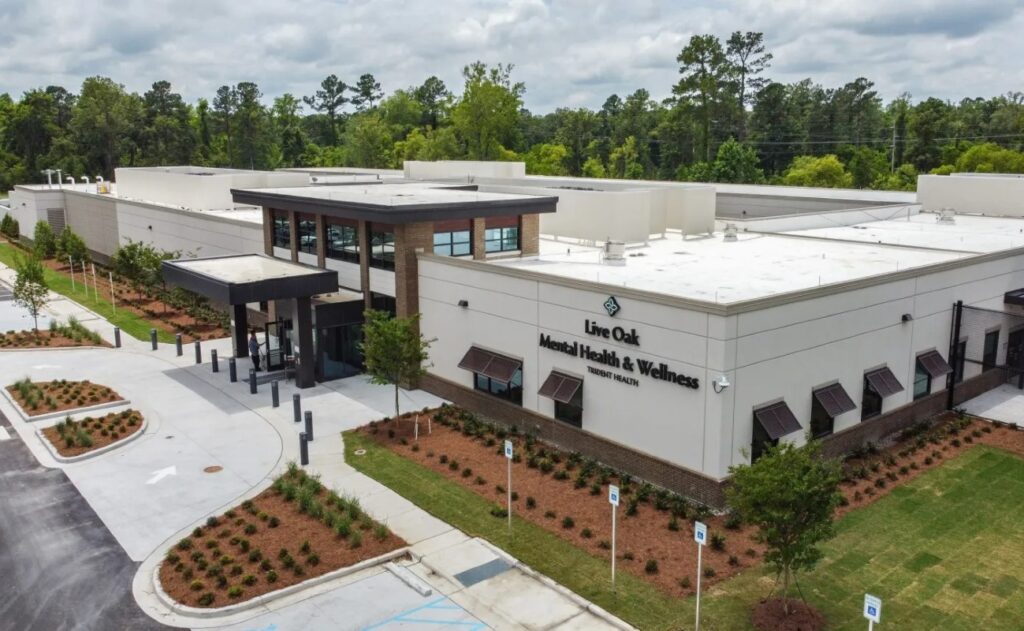
By Lily Levin | South Carolina is ranked the nation’s fifth worst state for the ability of residents to access mental health care facilities, according to a recent nationwide study.
The group that conducted the study, Mental Health Rehabs, analyzed data from the federal Substance Abuse and Mental Health Services Administration to calculate the number of mental health facilities per 100,000 people in each U.S. state. For South Carolina, the proportion was 1.59.
The Palmetto State was one of only seven states — alongside Texas, Hawaii, Florida, California and Alabama — with a ratio of less than two facilities per 100,000 people. Texas topped the “worst access” list, with a proportion still, barely, in the decimals: 0.99 centers for every 100,000 people. Boasting a ratio of 10.36 per 100,000, Alaska took first place for best access nationwide.
Law enforcement involvement, dangers
Melissa Camp, director of operations at Live Oak Mental Health and Wellness center in Ladson, explained that sometimes it’s not the lack of centers that poses the greatest issue, but the ability to get to them.
“The (S.C.) Department of Mental Health has … clinics in almost every county,” she said, “but even still, if you’re in a rural county and you don’t have transportation, that’s going to prevent you from going to care.”
She stressed that when folks can’t access the care they need initially, they may relapse. In turn, that might cause them to end up engaging with law enforcement officers.
Charleston County Sheriff’s Office (CCSO) Communications Director Amber Allen said if someone is undergoing a mental health crisis, a mobile unit will arrive. That person is evaluated by a clinician to decide whether hospitalization is needed. Deputies would, given necessary paperwork, take the individual to a hospital — a duty in addition to their regular responsibility of court-mandated transport, she added.
Allen said Charleston officers undergo mental health and crisis intervention training. But this isn’t a statewide policy: mental health and crisis intervention training for South Carolina law enforcement was first proposed in a 2019 bill that sought to mandate “a physician responsible for the patient’s care” to notify a friend or relative of the patient’s transport, who could then opt into transporting the person in crisis themselves.
Former S.C. Sen. Marlon Kimpson, D-Charleston, filed the bill in three consecutive sessions, the most recent of which was in 2023. He initially filed the policy in response to the 2018 drowning deaths of two people trapped in cages during a mental health-related police transport.
The legislation, however, is still stalled, and its champion recently left his position to join President Joe Biden’s team.
Recent successes in the Lowcountry
Some mental health facilities with inpatient programs in the Lowcountry include the Medical University of South Carolina, Palmetto Lowcountry Behavioral Health Center, the Tri-County Crisis stabilization center — a re-opened Department of Mental Health 10-bed unit — and the Charleston Center, which treats individuals with substance addiction disorders.
To improve the region’s mental health access landscape and respond to a growing need, Live Oak opened earlier this year. Camp explained that it’s distinct for many reasons.
The center is a 60-bed inpatient and outpatient service provider and, said Camp, “it’s the first freestanding behavioral health hospital built in over 30 years.” A freestanding hospital is not a wing within a larger service provider, which is how, for example, Medical University of South Carolina’s psychiatric facility operates.
Though the majority of patients arrive at the center voluntarily, Live Oak, like other mental health facilities and hospitals, receives people mandated by the court to seek treatment, known as involuntary commitment, the specifics of which vary by state. Camp said folks can access Live Oak’s inpatient treatment regardless of ability to pay.
But she also said a lot of patient processing comes from pre-scheduled intake with providers “really just trying to help people figure out which direction to go and what’s their next step,” in mental health care, which may not be services from the facility altogether. Camp noted that employees will take into account transportation needs and budget when coordinating a plan with a client.
The facility itself, she said, is designed unlike others in the area. It’s filled with natural light, open space and hanging artwork — an intentional measure to create a “soothing and calming” environment for those not in their “shiniest of moments.” Camp said the site also aims to decrease stigma surrounding mental health disorders, even if in small ways.
“Our front door is the front door for everybody,” staff, patients — whoever, she noted. And every employee in the building, from the cafeteria staff to care providers, has received training in trauma-informed care. “We want everybody to recognize that, you know, we’re all humans,” she said,” and we all sometimes need a little extra help.”
Lily Levin is a reporter with the Charleston City Paper, where a version of this story first appeared. Have a comment? Send to: feedback@statehousereport.com.
Biden, Harris to visit Palmetto State in days ahead

Staff reports | President Joe Biden, Vice President Kamala Harris and national Democratic leaders start descending on the Palmetto State this weekend in a kickoff of the political run up to South Carolina’s first-in-the-nation Democratic presidential primary on Feb. 3.
Meanwhile, Republican presidential candidates have been mostly absent from South Carolina in recent days as they flood into Iowa, New Hampshire and Nevada – states where GOP voters make primary or caucus decisions before the state’s first-in-the-South primary on Feb. 24.
On Saturday, Harris will speak to a church group in Myrtle Beach while Biden will make remarks Monday at Emanuel AME Church Monday. Harris then will visit Columbia Jan. 15 during King Day at the Dome celebrations.
On Monday, the president will be in Charleston to speak at the historic church in the latest signal of a campaign eager to shore up standing with Black voters. The visit is Biden’s first trip to the church since his vice presidency under former President Barack Obama. It is one of the oldest Black churches in the South and is the site where nine churchgoers were shot and killed by white supremacist Dylann Roof in 2015.
“Whether it is white supremacists descending on the historic American city of Charlottesville, the assault on our nation’s capital on January 6 or a white supremacist murdering churchgoers at Mother Emanuel nearly nine years ago, America is worried about the rise in political violence and determined to stand against it,” Biden-Harris 2024 Principal Deputy Campaign Manager Quentin Fulks said in a statement. “The president’s return to the Palmetto State marks the fourth time as president to talk directly to voters who propelled him to the highest office in the land four years ago.”
Biden’s visit also underscores how critically he regards the state. The president’s team is under pressure to demonstrate strength among the minority-heavy Democratic electorate there.
Details on the timing of the president’s visit and the contents of his speech are not yet available, but the speech is expected to be in the afternoon, tying up traffic throughout the peninsula.
 Also in the news:
Also in the news:
New budget. As we were publishing today, Gov. Henry McMaster released his 2024-25 executive budget proposal, which included suggestions for using a $1.65 billion surplus. We haven’t had time to analyze it, but you can find the budget here.
Word salad
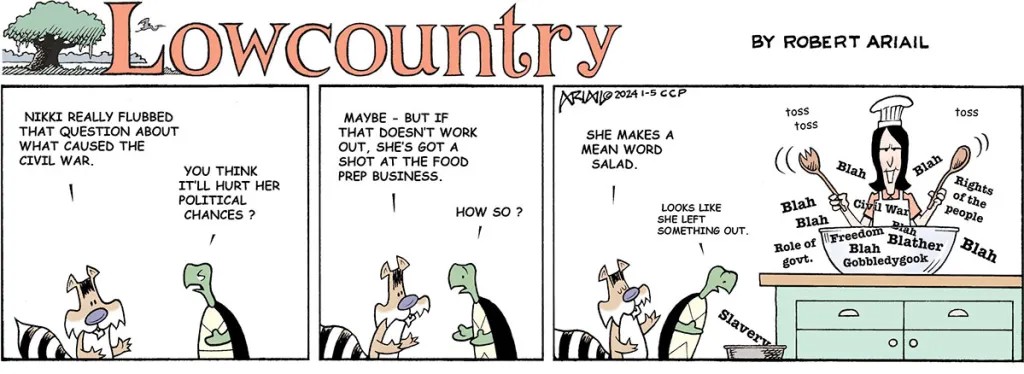
Award-winning cartoonist Robert Ariail generally has a biting or funny comment about the great state of South Carolina in his weekly cartoon. This week, he takes a look at the impact of former Gov. Nikki Haley not mentioning slavery as a cause of the Civil War in a New Hampshire town hall meeting in December.
- Love the cartoon? Hate it? What do you think: feedback@statehousereport.com.
State lawmakers should stop being nannies

By Andy Brack | The silly season in South Carolina is about to start. Yep, it’s an election year and the legislature is headed back into session in a few days filled with culture wars to fight.
 Good gracious, it would be just plain refreshing if they would debate real policy issues that mattered instead of trying to tell people what to do with their bodies. Legislative nannies were supposed to get that out of their system last year when they banned abortions after a “fetal heartbeat” is detected. The decision, upheld by the courts, essentially curtails abortions after about six weeks, which is when some women don’t even realize they’re pregnant.
Good gracious, it would be just plain refreshing if they would debate real policy issues that mattered instead of trying to tell people what to do with their bodies. Legislative nannies were supposed to get that out of their system last year when they banned abortions after a “fetal heartbeat” is detected. The decision, upheld by the courts, essentially curtails abortions after about six weeks, which is when some women don’t even realize they’re pregnant.
But now comes 2024 and the culture warriors have to make another divisive and fear-mongering stand to whip up red-meat voters to prove they’re more conservative than the even more conservative nutcase who wants to run against them.
So what do we get? More nannying.
One bill filed in November, for example, seeks to keep 16- and 17-year-olds from deciding whether they want nonsurgical medical care, such as prescription treatment for birth control or sexually transmitted diseases (STD), without permission of their parents or guardians.
The proposal, cooked up by S.C. Sens. Michael Johnson, R-York, and Josh Kimbrell, R-Spartanburg, assumes teen-agers don’t have the mental capacity to make decisions about their health – which is ludicrous. What teen-ager with an STD is going to want mommy and daddy to find out about it? The kid is going to want to handle it in consultation with a doctor – just like women who found themselves pregnant wanted to make a decision with their doctor instead of having the heavy hand of the state butt in and tell them what they could or couldn’t do with their bodies.
So here we go again, with two South Carolina men with power who want to control people’s bodies. It’s pretty clear already this bill filled with unintended consequences is going to face a firestorm from the six women in the chamber (Five won a national award for legislative courage last year for standing up for women during a grueling abortion debate. Just this week, former Columbia city council member Tameika Isaac Devine won a special election to become the sixth woman among 46 state senators.}
State Sen. Sandy Senn, R-Charleston, says the sponsors of the nanny bill so far have refused to exclude 16- and 17-year-old girls from its negative impacts.
“We all want to keep our girls little forever and have them practice abstinence,” she told Statehouse Report. “But like it or not, they grow up and the choice is theirs.
“Keeping 16- and 17-year-old girls away from birth control when they have privately told their doctors that they want to be on it is a tactic that will not age well. And with South Carolina being the number three state in the nation for highest rates of STDs, do lawmakers really want our older teens to suffer from an STD, untreated, and spread it around all because the legislature has mandated that doctors and pharmacists tell their daddies on them?”
In other words, male state lawmakers need to grow up and stop using the heavy hand of government (we thought they wanted the government out of our lives) to fight their politically expedient culture wars. If you want to be nannies, how about doing something about the gun violence that’s killing way too many people across the state, instead of taking a pass year after year on reasonable measures like closing the Charleston gun loophole or universal background checks.
The nanny bill by Johnson and Kimbrell isn’t the only thing teed up to keep the culture wars alive this year. According to The State newspaper, at least nine bills were pre-filed in the S.C. House related to gender – gender transition, gender care, gender-assigned bathrooms and other issues related to the LGBTQ community. Geez, it would be great if they could have some consistency in how they treat people – like, maybe, leaving people alone.
The 2024 session gets underway at noon on Tuesday. Lord, grant us peace.
Andy Brack is editor and publisher of Statehouse Report and the Charleston City Paper. Have a comment? Send to: feedback@statehousereport.com.
S.C. Farm Bureau
 Statehouse Report is provided for free to thousands of subscribers thanks to the generosity of our underwriters. Today we shine a spotlight on our newest underwriter, S.C. Farm Bureau. It is a grassroots, non-profit organization that celebrates and supports family farmers, locally-grown food and rural lands through legislative advocacy, education and community outreach.
Statehouse Report is provided for free to thousands of subscribers thanks to the generosity of our underwriters. Today we shine a spotlight on our newest underwriter, S.C. Farm Bureau. It is a grassroots, non-profit organization that celebrates and supports family farmers, locally-grown food and rural lands through legislative advocacy, education and community outreach.
S.C. Farm Bureau’s alliance of nearly 100,000 members includes everyone from foodies and fishermen to lawyers, restaurateurs, entrepreneurs, community leaders, and of course, farmers. By connecting farmers to the larger community, the organization cultivates understanding about agriculture’s importance to our local economies. The S.C. Farm Bureau explains its mission: “We deepen our collective knowledge of who, where and how food grows. We empower people to make informed choices. We grow mutually-beneficial relationships. And, we ensure the future of the family farms, locally-grown food and the rural South Carolina lands we love.”
- To learn more about S.C. Farm Bureau’s programs, click here.
- To view media and publications, click here
- For policy and legislation, click here.
Teachers want a culture of respect
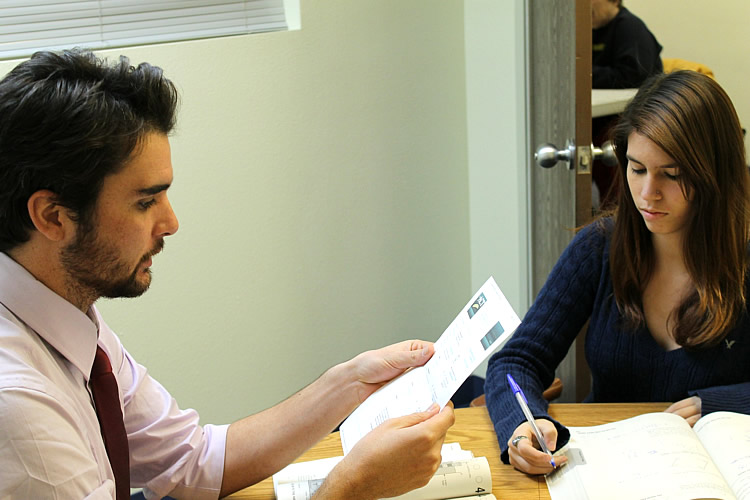
By Sherry East, SCEA President | As we enter the second half of the 125th session of the General Assembly, the South Carolina legislature should further prioritize education.

The first half of this session saw significant strides for educators, such as paid parental leave and increases to the minimum salary schedule. But while these policies are strong improvements, there is still a vital component that is missing from our education policy: respect for educators.
One of the biggest factors driving teachers out of classrooms is a lack of respect. Whether it’s members of the legislature trying to tell educators which books they can teach or what topics they can discuss, members of the community trying to police teachers that aren’t even in their district, or administrators refusing to listen to educators and give them the support they need, educators do not feel like their leaders or their community respect the job they do. If we truly want to end the educator shortage, then it is imperative that we treat educators and public school employees with respect. One effective way to do this is through legislative policy.
The South Carolina Education Association (SCEA)’s legislative agenda focuses on three main policy outcomes: ensuring equitable and effective funding, respecting educators as professionals, and providing an education of excellence. The longest and most detailed part is the second section, because this is the key to solving the teacher shortage.
Let’s look at the policies we believe will create this culture of respect.
Respecting educators as professionals must, of course, begin with competitive compensation. Educators should not have to work two or three jobs to make ends meet. While teacher pay has increased over the past two years, Education Support Professional (ESP) pay has not. The average ESP salary in South Carolina is $29,579. That means there is not a single county in the state where a support professional earning an average salary can afford to live without a second job. For our state to be competitive, we must raise teacher salaries to a minimum of $50,000 and support staff salaries to $36,000.
Respect also means trusting teachers as education experts. We are highly trained in best practices in the classroom and on the subject matter we teach. We know which materials work best for our classes and which assessments best measure concept mastery. Most importantly, we know how to teach our students the skills they need to thrive. Our elected officials can show us that they respect our training by rejecting legislation like H.3728 that limits what history our students can learn or which books they can read. Our legislators can respect our training by allowing us to teach curriculum without political censorship, undue scrutiny, or top-down bureaucratic policies that limit natural communication with parents.
Respecting educators includes ensuring that every educator receives unencumbered time during the school day. Thirty minutes of unencumbered time went into effect for elementary school teachers at the start of this school year; this is a big win, but it is time to expand that to educators at all levels. The lack of planning time means that educators work far above their contracted hours in order to plan lessons, grade papers, and complete other tasks that cannot be done during instructional time.
Educators, parents, community members and legislators share the goal of providing our students with quality, affordable, accessible education. But the only way to provide South Carolina students with the top-tier education they deserve is to create a culture of respect for educators – because our working conditions are our students’ learning conditions. Implementing these policies would show educators that their hard work and professional expertise are respected, which would reduce burnout and turnover and ultimately create better academic outcomes for students.
- You can read our full legislative agenda at www.thescea.org/legagenda.
Sherry East of Rock Hill is president of the S.C. Education Association. She is a high school science teacher. Have a comment? Send to: feedback@statehousereport.com
Old building
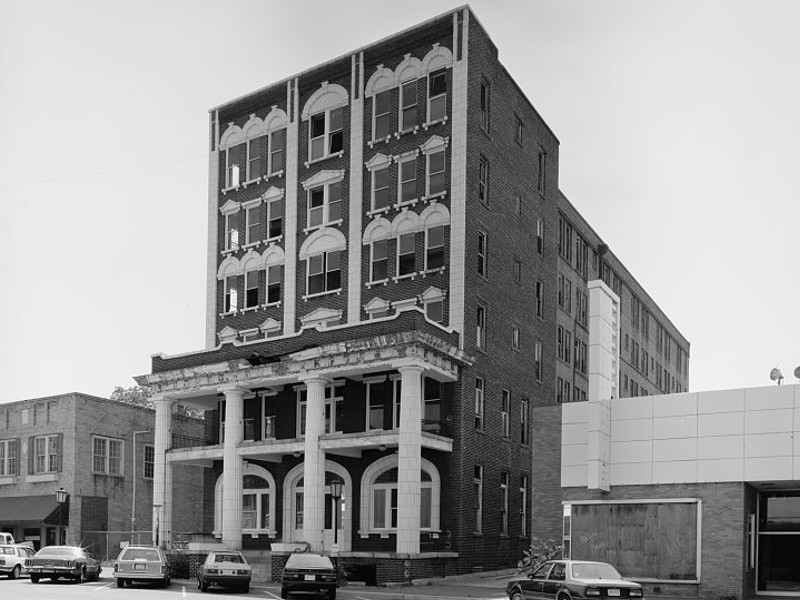
Here’s an old South Carolina building that is sure to have a lot of stories in its past. Send us your guess of what and where this photo is – as well as your name and hometown – to feedback@statehousereport.com.
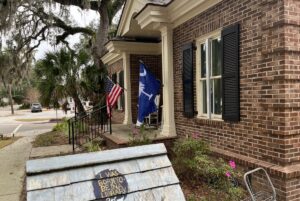 Last week’s mystery photo, “Clue” shows the exterior of the Pat Conroy Literary Center in Beaufort, which Elizabeth Jones of Columbia shares “exists to educate and inspire a community of readers, writers and teachers in and beyond the South Carolina Lowcountry. It has been designated a literary landmark by the American Library Association. Founded in 2016, the center began in the 700-square-foot house where Pat Conroy spent most of the last years of his life. It later moved to a nearby 3,000-square-foot renovated bank building where it exists at 601 Bladen St.”
Last week’s mystery photo, “Clue” shows the exterior of the Pat Conroy Literary Center in Beaufort, which Elizabeth Jones of Columbia shares “exists to educate and inspire a community of readers, writers and teachers in and beyond the South Carolina Lowcountry. It has been designated a literary landmark by the American Library Association. Founded in 2016, the center began in the 700-square-foot house where Pat Conroy spent most of the last years of his life. It later moved to a nearby 3,000-square-foot renovated bank building where it exists at 601 Bladen St.”
Hats off to her and others who identified it, including Allan Peel of San Antonio, Texas; Steve Yarborough of West Columbia; David Lupo of Mount Pleasant; Barry Wingard of Florence; Michael Webb of Hartsville; Jay Altman of Columbia; George Graf of Palmyra, Va.; and David Taylor of Darlington.
- Send us a mystery picture. If you have a photo that you believe will stump readers, send it along (but make sure to tell us what it is because it may stump us too!) Send to: feedback@statehousereport.com and mark it as a photo submission. Thanks.
Send us your thoughts
We encourage you to send in your thoughts about policy and politics impacting South Carolina. We’ve gotten some letters in the last few weeks – some positive, others nasty. We print non-defamatory comments, but unless you provide your contact information – name and hometown, plus a phone number used only by us for verification – we can’t publish your thoughts.
- Have a comment? Send your letters or comments to: feedback@statehousereport.com. Make sure to provide your contact details (name, hometown and phone number for verification. Letters are limited to 150 words.
- ORDER NOW: Copies are in Lowcountry-area bookstores now, but if you can’t swing by, you can order a copy online today.
- Now available as an e-book!
ABOUT STATEHOUSE REPORT
Statehouse Report, founded in 2001 as a weekly legislative forecast that informs readers about what is going to happen in South Carolina politics and policy, is provided to you at no charge every Friday.
- Editor and publisher: Andy Brack, 843.670.3996
Donate today
We’re proud to offer Statehouse Report for free. For more than a dozen years, we’ve been the go-to place for insightful independent policy and political news and views in the Palmetto State. And we love it as much as you do.
But now, we can use your help. If you’ve been thinking of contributing to Statehouse Report over the years, now would be a great time to contribute as we deal with the crisis. In advance, thank you.
Buy the book
Now you can get a copy of editor and publisher Andy Brack’s We Can Do Better, South Carolina! ($14.99) as a paperback or as a Kindle book ($7.99). . The book of essays offers incisive commentaries by editor and publisher Andy Brack on the American South, the common good, vexing problems for the Palmetto State and interesting South Carolina leaders.
More
- Mailing address: Send inquiries by mail to: P.O. Box 21942, Charleston, SC 29413
- Subscriptions are free: Click to subscribe.
- We hope you’ll keep receiving the great news and information from Statehouse Report, but if you need to unsubscribe, go to the bottom of the weekly email issue and follow the instructions.
- Read our sister publication: Charleston City Paper (every Friday in print; Every day online)
- © 2023, Statehouse Report, a publication of City Paper Publishing, LLC. All rights reserved.















 We Can Do Better, South Carolina!
We Can Do Better, South Carolina!